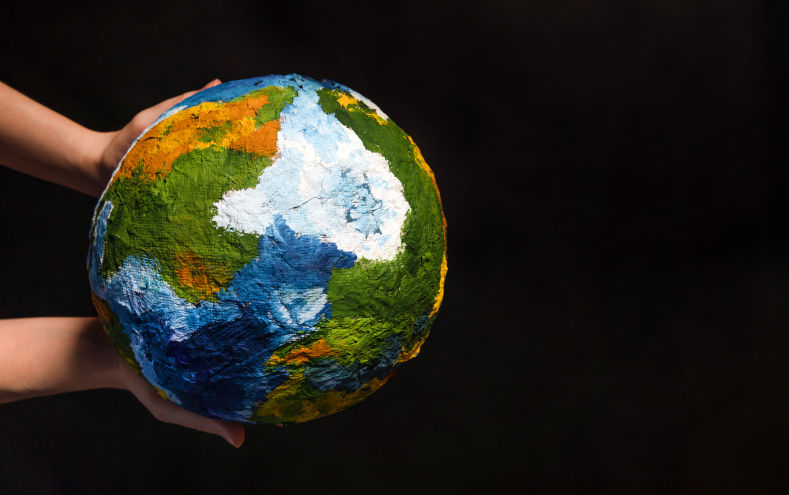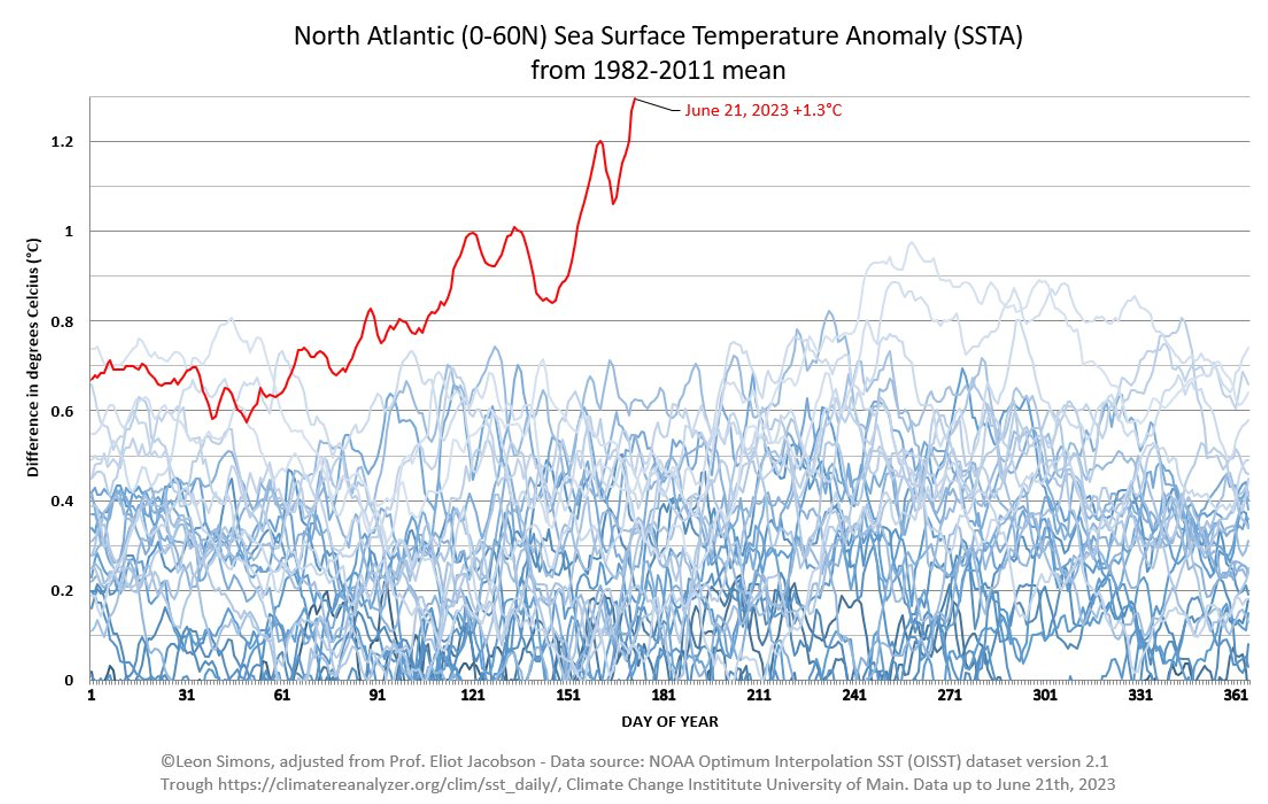
While much of humanity was glued to the unfolding drama over one tiny submarine, the Earth we all inhabit is slowly, steadily and implacably imploding around us.
Ocean temperatures are raging off the scale, icecaps are melting and seas rising, forests are ablaze across continents, ‘heat bombs’ in heavily populated regions are pushing them into the wet bulb ‘death zone’. Water supplies are running out in scores of countries, food chains are tottering, wildlife is vanishing quicker than it did in the Jurassic and forests falling faster. The drumbeat to nuclear war grows louder. A third of a billion people are on the road every year, seeking to escape the crises they foresee in their homelands.

Politicians won’t discuss global collapse or extinction because they are terrified that so much truth will put people off voting for them. Cowardice and dishonesty remain the safest electoral policies. The trouble is, they make collapse and even extinction all the more likely.
Whatever the optimists, or fantasists, may tell you, the collapse of human industrial civilisation is in the view of a growing body of expert scientists, now possible. With rare candour, the last UN Global Risks Report warned of “a dangerous tendency for the world to move towards a global collapse scenario”. Which is putting it as bluntly as such organisations ever like to go.
To clarify the situation for those who may still be confused, or under a misapprehension that climate is the big problem, there are ten catastrophic risks, not just a couple. They are all closely connected, meaning they cannot be tackled one-by-one. Together, these risks present an existential crisis for humanity greater than any in our million-year tenure on planet Earth. A crisis which the world’s governments, its leading business enterprises and its community leaders refuse to acknowledge – partly because they do not understand it, partly because they do not know what to do about it and partly because they are making ‘money’ out of it.
For the record, the risks are:
- Extinction and ecocide – the destruction of the Earth’s life support systems.
- Resource depletion – depletion of fresh water, soil, forests, fish and other key resources.
- Global poisoning – universal chemical pollution.
- Global overheating – accelerating climate change.
- A new nuclear arms race – featuring dangerous new weapons and killer robots.
- Food insecurity – weakening of farming and marine food systems and supply chains.
- Overpopulation – human numbers vastly outrunning the Earth’s carrying capacity.
- New pandemic diseases – arriving out of ruined environments and science labs.
- Uncontrolled technologies – like AI, biotech, nanotech and universal surveillance.
- Misinformation and mass delusion – paralysing our ability to act to save ourselves.
Of these ten mega-risks, eight are ‘catastrophic’, meaning they can inflict global catastrophes on humanity and two are ‘existential’, meaning they threaten human existence: these two are nuclear arms and ‘hothouse Earth’ above +4 degrees. However, all ten risks, collectively, add up to one giant threat to future human survival – maybe not in the short term, but certainly within two or three generations. Researchers from the University of Oxford have assessed the probability of our entire species going extinct from a number of causes in a given year is as high as 1 in 14,000. To put that in personal terms, humans are 3000 times more likely to become extinct than you are to win the lottery.
The risks are being made worse by the fact that the lies told about them by the fossil fuels lobby are being amplified by the media and by politicians, both of whom it controls. Humanity in general is being denied the chance to understand and solve the risks by corrupt governance (both democratic and autocratic). How successful this evil confederation has been may be seen in the fact that, in 1992 at Rio de Janeiro, the world’s nations vowed to “protect the climate system for the benefit of present and future generations of humankind”. Three decades later, the climate is growing markedly more dangerous as global headlines every day inform us, and as scientific measurements of the atmosphere, icecaps and oceans attest.
Yet still, to this day, no country on Earth thinks our civilisation or even humans themselves are worth the effort of saving. Nobody has a Plan for Human Survival.
UN Secretary General Antonio Gutierres, evidently an increasingly frustrated man, has spoken with rare honesty about the threats we are now embracing by our apathy, ignorance and self-imposed paralysis. Here is a small sample his recent utterances:
- “The fossil fuel industry is at the heart of the climate crisis.”
- “Our ocean is under threat.”
- “Digital platforms are being misused to subvert science & spread disinformation & hate to billions of people.”
- “More than 110 million people are displaced due to conflict, persecution, hunger & climate chaos.”
- “Our world needs peace. Now more than ever.”
- “Thousands of chemicals are used in plastics, many of them harmful to our health. To protect people & the planet, we must address this problem.”
- “Nowadays, the prospect of technological progress often inspires fear rather than hope.”
Gutierres’ statements are all founded on tested scientific fact – but you will hardly ever find such truths issuing from the lips of national politicians or corporate bosses. This underlines one of the chief risks to human survival: the nation state, from being a valued and respected instrument of governance, has now become the primary obstacle to our continued existence. As is the global corporation. The shallow and self-serving interests of nations and corporates, and their need to compete against one another on petty matters, will combine to wreck the future for humanity as a whole.
If States cling to their nuclear arsenals, to their fossil fuels resources, to their right to ruin their forests and wilderness, and poison their air, soil and water, it will be to the cost of all – not just themselves. In an overpopulated world, every major action triggers shockwaves that reverberate planet-wide. There is no escaping them or their consequences, for anybody.
Hence the need for a universal plan of action for human survival. Because nations are too mean, too contentious, too short-sighted to consider even their own best interests. And they are being run by a new generation of gold-digging, bottom-feeding, undereducated politicians determined to ruin the planet to suit themselves.
Such a plan of action may be best developed through an Earth System Treaty, a universal agreement which addresses all ten of the megathreats with practical solutions, and commits everyone – not just nations – to working together to achieve a habitable planet for our grandchildren to live upon.
Has there ever been a finer, more noble undertaking in the whole of human history? Is it not high time we act together, as a single people on one planet, to achieve it? For the sake of our grandchildren? Is it not time we forsook the petty interstate chest-thumping, conflict and contention in the interests of our collective survival – as a civilisation and as a species?
Australia, with everything going for it, could be a world leader in such a movement instead of a laggard and a wrecker of both climate and environment. Instead of planning for future wars with China, Australia ought to be planning to save itself. But it isn’t. Like the people glued to the tale of the imploding mini-submarine, we are too obsessed with tiny dramas to notice the vast, universal one that overshadows us all.




